Russia
India’s prime minister embarks on a two-day trip to Russia starting Monday, marking his first visit since Moscow deployed troops to Ukraine.
Prime Minister Narendra Modi’s visit will include a meeting with President Vladimir Putin, whom he last met in Russia in 2019, in the far eastern port of Vladivostok.
According to Chietigj Bajpaee, a senior South Asia research fellow at the U.K.-based Chatham House, India is gradually distancing itself from forums where Russia and China hold significant influence.
“This is evident in India’s relatively subdued presidency of the Shanghai Cooperation Organization last year, and now, Modi’s decision not to attend this year’s summit,” Bajpaee noted.
The two leaders also had a face-to-face meeting in September 2022 in Uzbekistan during a summit of the Shanghai Cooperation Organization bloc.
India has been a significant trading partner for Russia since the Cold War era, with its importance growing after the Kremlin’s military intervention in Ukraine in February 2022.
Under Modi’s leadership, India has refrained from criticizing Russia’s actions in Ukraine while stressing the importance of a peaceful resolution.
The ongoing conflict has strained the relationship between the two long-standing allies and pushed Russia closer to India’s competitor, China.
India has been a significant trading partner for Russia since the Cold War era, with its importance growing after the Kremlin’s military intervention in Ukraine in February 2022.
Both China and India have emerged as key purchasers of Russian oil following sanctions imposed by the United States and its allies, which restricted Russian exports to most Western markets.
Modi notably skipped the recent summit of the Shanghai Cooperation Organization in Kazakhstan last week.
The clash in June 2020 along the disputed China-India border significantly strained their already tense relationship as troops from both sides engaged in physical combat.
The skirmish resulted in the deaths of at least 20 Indian soldiers and four Chinese troops.
Tensions have persisted since then despite the talks.
The tensions between India and Russia have influenced New Delhi's perspective on Moscow.
Analyst Theresa Fallon from the Center for Russia, Europe, Asia Studies highlighted India's concerns about Russia's growing ties with China in the strategic triangle.
Despite this, Prime Minister Modi aims to maintain strong relations with Russia, a crucial trade partner and defense supplier for India.
With Western sanctions limiting Russian oil exports, India has become a significant buyer of Russian oil, accounting for over 40% of its imports.
While India heavily relies on Russia for military equipment, recent disruptions in Moscow's supply chain due to the conflict in Ukraine have prompted India to diversify its defense procurements by increasing purchases from the U.S., Israel, France, and Italy.
Defense cooperation remains a key focus, with 60% of India's military equipment still originating from Russia.
The delay in spare parts deliveries following the Ukraine invasion has prompted discussions on a military logistics agreement between the two countries.
India has maintained a neutral stance on Russia's actions in Ukraine, advocating for negotiations to resolve the conflict.
This stance has supported Putin's efforts to counter Western influence on global affairs.
Putin's limited foreign travel due to an arrest warrant from the International Criminal Court could benefit from Modi's visit, enhancing Putin's international image.
The visit also serves as a signal to Putin's domestic audience that world leaders are engaging with him, countering perceptions of isolation.
India's trade with Russia has surged significantly, reaching nearly $65 billion in the fiscal year 2023-24, driven by robust energy collaboration, as stated by India's Foreign Secretary Vinay Mohan Kwatra during a press briefing last Friday.
During the 2023-24 fiscal year, imports from Russia amounted to $60 billion, while exports from India stood at $4 billion, Kwatra revealed. The Indian financial year spans from April to March.
Efforts are being made by India to address the trade deficit with Russia by boosting its exports.
Key exports from India to Russia encompass pharmaceutical products, telecommunications equipment, iron and steel, marine products, and machinery.
On the other hand, major imports from Russia include crude oil, petroleum products, coal, pearls, precious and semi-precious stones, fertilizers, vegetable oil, gold, and silver.




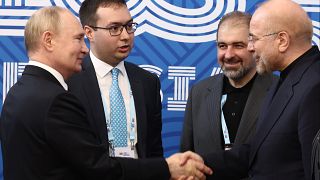
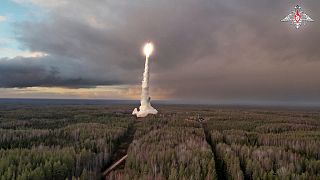
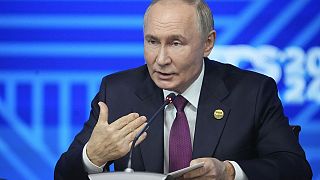
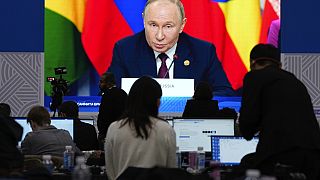
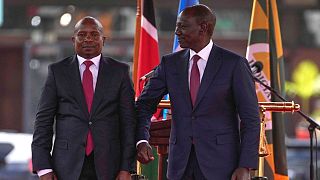
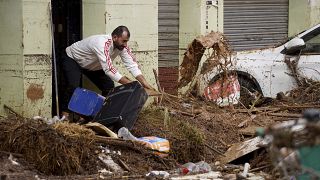
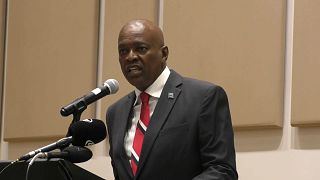
01:02
Putin hosts BRICS summit, Defies Western isolation
01:47
Ukrainian president presents 'victory plan'
Go to video
Zambia signs deal with China for its first cholera vaccine plant
01:10
Mongolia defies calls to arrest Russian President Vladimir Putin
Go to video
Russia unleashes massive drone and missile attack on Ukraine, 3 killed
01:47
On Independence Day, Ukraine says it will regain 'territorial integrity'